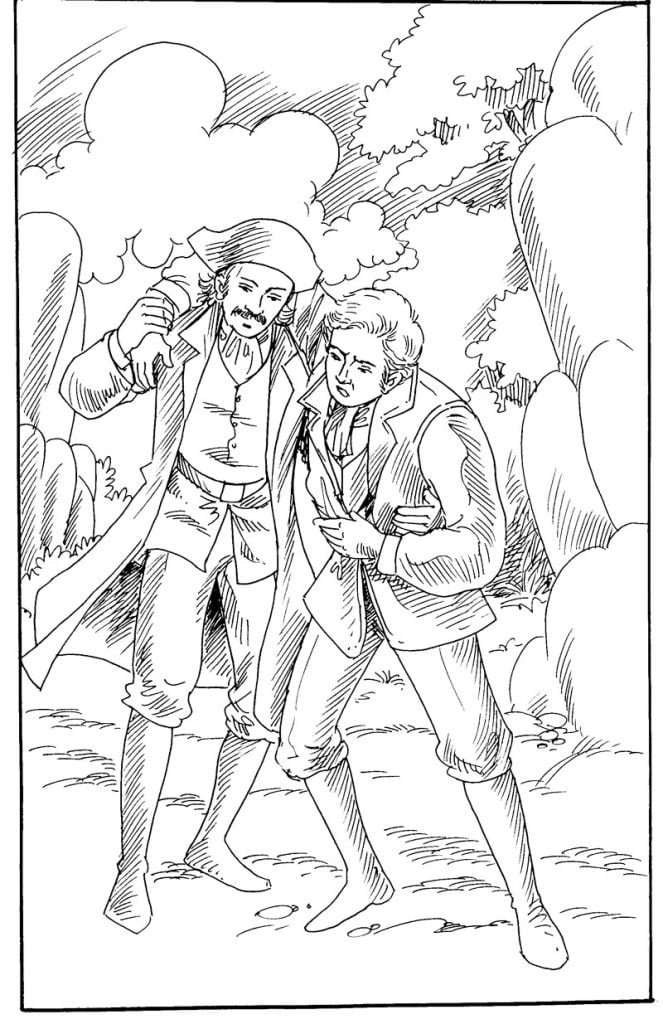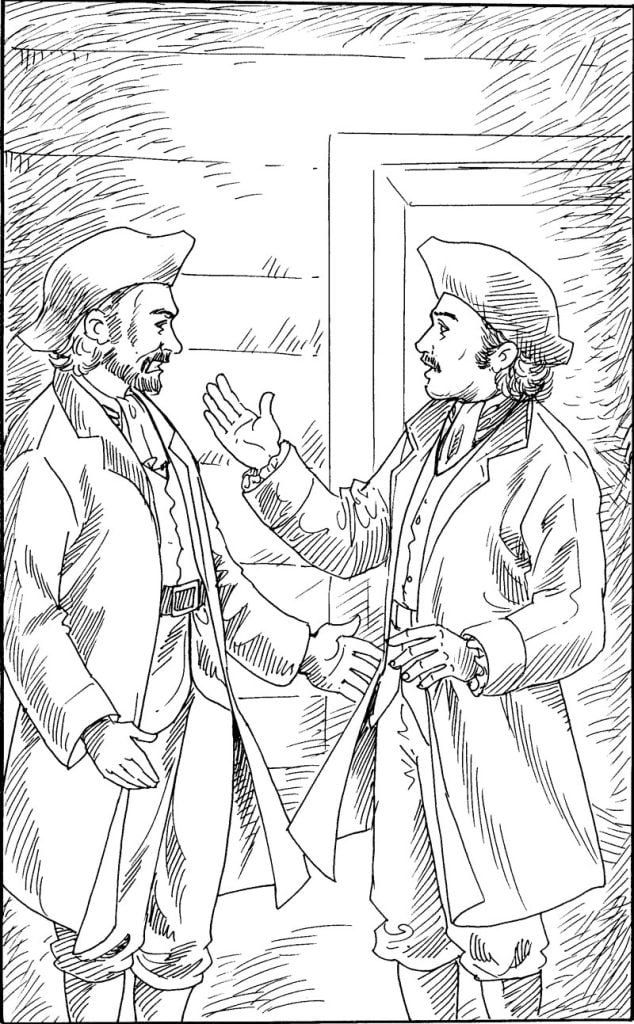Chapter 9
For long, we said nothing. We marched along. I was angry and proud. Alan was angry and ashamed. He was ashamed that he had lost my money and angry that I should be so upset about it. I thought of leaving him, but I could not turn to a friend who certainly loved me and say, “You are in great danger; I am in little danger. Your friendship puts me in danger, so go on alone.” No, that was impossible.
And yet Alan had taken my money, when I was half-conscious, and lost it. I was ready to share it with him, but not ready for him to lose it at cards.
For most of three nights we travelled on eerie mountains and among wild rivers. We were often buried in mist, almost continually blown and rained upon. And not once cheered by any glimpse of sunshine. It was never warm; my teeth chattered in my head. I also had a very sore throat.
During these horrid wanderings we hardly spoke. I was almost wishing I was dead. I was unforgiving by nature, slow to get angry, slower to forget it, and now furious with Alan and with myself. Sometimes he would tease me to try to make me talk. I was silent.
“David,” said he, “this is no way for two friends to take a small accident. I have to say that I’m sorry, and so that’s said. I have long owed you my life, and now I owe you money. You should try to make that burden light for me.”
“Both the Campbell’s and the King’s men have beaten you,” said I, “You have run before them like a hare.”
Alan stood quite still. “This is a pity,” he said at last, “there are things said that cannot be forgotten.”
“I’m not asking you to do anything,” said I, “Come on!” and drawing my sword, I fell on guard as Alan had taught me.
“David!” he cried, “I cannot draw on you. It’s murder. No, no,” he kept saying, “I cannot.”
At this, the last of my anger oozed all out of me, and I found myself only sick, and sorry, and blank, and wondering at myself. I remembered all of Alan’s kindness and courage in the past, how he had helped and cheered me in our evil days. I thought that I had lost that good friend for ever. I couldn’t even tell him I was sorry for the things I had said.

The pain in my side was like a sword; it was so sharp. No apology could blot out what I had said, but a cry for help might make him stay with me.
“Alan!” said I, “if you cannot help me, I must just die here.”
He stared up and looked at me.
“It’s true,” I said.
“Can you walk?” asked Alan.
“No,” said I, “not without help. I cannot breathe right. If I die, will you forgive me, Alan? In my heart, I liked you fine, even when I was angry.”
“Don’t say that!” He shut his mouth with a sob. “Let me get my arm about you. Now lean on me hard. I’ll find a house for you, David. There should be a house that’s safe near by.”
“Alan,” cried I, “what makes you so good to me? What makes you care for such a thankless fellow?”
“I don’t know,” said Alan, “I thought that I liked you because you never argued. But now that we’ve yelled I like you better!”
All this time Alan would not leave me though I often told him he was a fool to stay in the country, and the two or three friends that were let into our secret told him the same. He hid by day in a hole in the thicket and would come into the house to visit me at night when the coast was clear. I was always pleased to see him. Mrs. Maclaren thought nothing was good enough for him, and as Duncan, her husband, had a pair of bagpipes, this time of my recovery was quite a festival. We had music every night.
Before I left, all the people in Balquhidder knew I was there, and they knew I had come with Alan. It wasn’t hard to guess that I was the other man who was wanted for the murder of the Red Fox. I had changed my clothes, but I couldn’t change my age or my looks, and there were notices for our arrest everywhere. Someone brought me one to look at, and it was pinned near the foot of my bed.
But no one came to question me, and the soldiers left the house alone. So it was. Some folk try to keep a secret between two or three friends, but it leaks out. Among these clansmen, it is told to a whole countryside, and they will keep it secret for a century.
There was only one thing that happened worth telling. Alan almost got himself in a serious sword fight with Robin Oig. Robin was one of the sons of the notorious Rob Roy and also had the law after him. He was a Campbell. Robin came by the house close the time of Alan’s coming. Duncan and I were worried; the two would not be likely to agree with each other if they met.
On his way out, Robin met Alan coming in, and the two drew back and looked at each other like strange dogs. In no time, they were politely insulting each other and ready to draw swords. I was half out of bed to try to stop them when Duncan came between the two.

“Gentleman,” said he, “here are my pipes. You both claim to be great pipers. Here’s a chance to find out which one of you is the best.” The two enemies were still on the edge of a fight, but down they sat, one on each side of the fire, with a mighty show of politeness.
It wasn’t long before Robin Oig had charmed us all with his blowing and warbling on the pipes. Then all night long the music was going and the pipes were changing hands. The new day had become pretty bright before Robin even thought about leaving.
It was already far through August, and it was beautiful warm weather. We were now in a hurry. If we didn’t come to Mr. Rankeillor’s soon to claim my inheritance, or if when we came there he wouldn’t help us, we would starve. Alan thought the hunt after us must have let off by now and that we might be able to cross the Stirling Bridge with little trouble.
It was on a warm night when we came to the edge of the hills and saw all of Stirling below, as flat as a pancake. The town and the castle were on a hill in the middle of it, and the moon was shining on the Forth River.
Now,” said Alan, “I do not know if you care but you’re in your own land again. We passed the Highland line in the first hour. If we could but pass the crooked water, we’d be home free.”
We waited till the night grew darker and then moved to the narrow bridge. It looked like the very doors of Salvation to Alan and me. I was for going straight across, but Alan was more careful. We hid and listened as an old hobbling woman with a crutch crossed the bridge. And just then—“Who goes?” cried a voice, and we heard the butt of a musket rattle on the stones. There was guard on the bridge.
“This’ll never do,” said Alan, “This’ll never, never do for us, David.”
He began to crawl away through the fields and then struck along a road that led east.
Just a moment back, I had seen myself knocking at Mr. Rankeillor’s door like a hero in a ball and here I was again, wandering, hunted, and on the wrong side of the water.
Alan was moving towards the inlet, as wide as a sea. I argued that it would be easier to cross the river.
“How,” said he, “when all the bridges and fords are watched?”
“Well,” said I, “a river can be swum.”
“I have yet to hear that either you or me is much good at that. I swim like a stone.” Then he said, “There’s such a thing as a boat.”
“Oh, and money to pay for one. We have no money and no boat, so forget both,” said I.
“David,” said he, “you’re a man of little invention and less faith. If we cannot beg, borrow, or steal a boat, I’ll make one!”
“Then,” said I, “we have a boat left on the wrong side of the river. Someone will guess who brought it.”
“David!” cried Alan, “If I make a boat, I’ll make a body to take it back again.”
To be sure, Alan did both. He made me pretend I was tired and ill, and Prince Charlie himself! The young lass at the inn where we stopped believed our game and told us that she would help if she could. She would try to find a way across the inlet for us. Alan’s tale had got us what we needed.
We hid in a nearby wood and waited for the end of day. It was past eleven at night, and we were worried that something had gone wrong. Then we heard the grinding of oars in the rowing pins. We looked out and saw the lass herself rowing to us in a boat. She had trusted on one else, but had stolen a neighbour’s boat and had come alone when everyone was asleep.
After she had gone, we had nothing to say for such a kindness. Alan stood a long while upon the shore, shaking his head.
“It is a very fine lass,” he said at last “David, it is a very fine lass,” I didn’t say anything. She was such a fine lass, and I feared that we had involved her in the dangers of our own situation.

